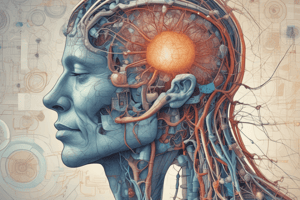Podcast
Questions and Answers
What is the primary pathology in Parkinson's disease?
What is the primary pathology in Parkinson's disease?
- Degeneration of neurons in the hippocampus that supply serotonin
- Degeneration of neurons in the substantia nigra that supply dopamine (correct)
- Degeneration of neurons in the striatum that supply dopamine
- Degeneration of neurons in the cerebral cortex that supply acetylcholine
What is the result of the degeneration of neurons in the substantia nigra?
What is the result of the degeneration of neurons in the substantia nigra?
- An increase in dopamine receptors
- A decrease in acetylcholine receptors
- An imbalance between serotonin and norepinephrine
- An imbalance between dopamine and acetylcholine (correct)
What is the primary mechanism of action of levodopa in treating motor symptoms of Parkinson's disease?
What is the primary mechanism of action of levodopa in treating motor symptoms of Parkinson's disease?
- It blocks cholinergic receptors
- It directly activates dopamine receptors
- It indirectly activates dopamine receptors by converting to dopamine (correct)
- It inhibits the reuptake of dopamine
What is the enzyme that converts levodopa to dopamine?
What is the enzyme that converts levodopa to dopamine?
What is the effect of combining levodopa with a nonselective MAO inhibitor?
What is the effect of combining levodopa with a nonselective MAO inhibitor?
What is the effect of high-protein meals on the therapeutic effects of levodopa?
What is the effect of high-protein meals on the therapeutic effects of levodopa?
What is the role of carbidopa in levodopa therapy?
What is the role of carbidopa in levodopa therapy?
Which of the following antipsychotic drugs can be used safely to treat levodopa-induced psychosis?
Which of the following antipsychotic drugs can be used safely to treat levodopa-induced psychosis?
Flashcards are hidden until you start studying
Study Notes
Parkinson's Disease (PD)
- PD is a neurodegenerative disorder characterized by motor symptoms: tremor at rest, rigidity, postural instability, and bradykinesia.
- Nonmotor symptoms of PD include autonomic dysfunction, sleep disturbances, depression, psychosis, and dementia.
Pathology of PD
- Primary pathology in PD is the degeneration of neurons in the substantia nigra that supply dopamine to the striatum.
- This results in an imbalance between dopamine and acetylcholine.
Treatment of Motor Symptoms
- Motor symptoms are primarily treated with drugs that directly or indirectly activate dopamine receptors.
- Drugs that block cholinergic receptors can also be used.
- Levodopa (combined with carbidopa) is the most effective treatment for motor symptoms.
- Levodopa relieves motor symptoms by converting to dopamine in surviving nerve terminals in the striatum.
Levodopa
- The enzyme that converts levodopa to dopamine is called a decarboxylase.
- Acute loss of response to levodopa occurs in two patterns: gradual wearing off and abrupt loss of effect (“on-off” phenomenon).
- Principal adverse effects of levodopa include nausea, dyskinesias, hypotension, and psychosis.
Interactions with Other Drugs
- First-generation antipsychotic drugs block dopamine receptors in the striatum, negating the effects of levodopa.
- Second-generation antipsychotics like clozapine and quetiapine do not block dopamine receptors and can be used safely to treat levodopa-induced psychosis.
- Combining levodopa with a nonselective MAO inhibitor can result in hypertensive crisis.
Carbidopa
- Carbidopa enhances the effects of levodopa by preventing decarboxylation of levodopa in the intestine and peripheral tissues.
- Carbidopa cannot cross the blood-brain barrier, allowing conversion of levodopa to dopamine in the brain.
Pramipexole
- Pramipexole is an oral nonergot dopamine agonist used as a first-line drug for motor symptoms.
- It can be used alone in early PD and combined with levodopa in advanced PD.
Studying That Suits You
Use AI to generate personalized quizzes and flashcards to suit your learning preferences.



